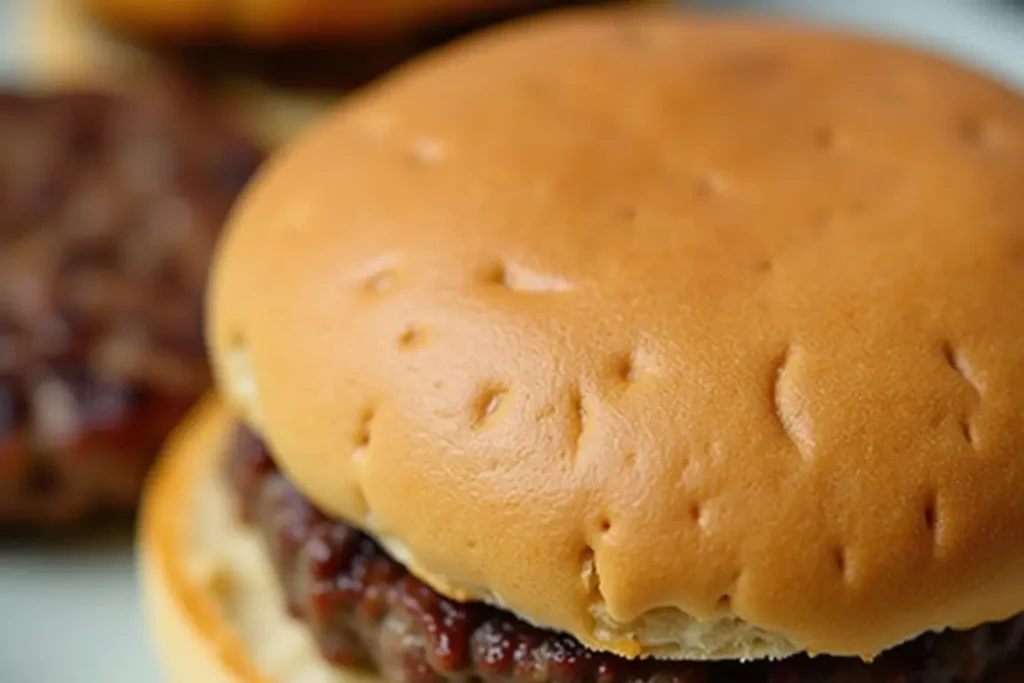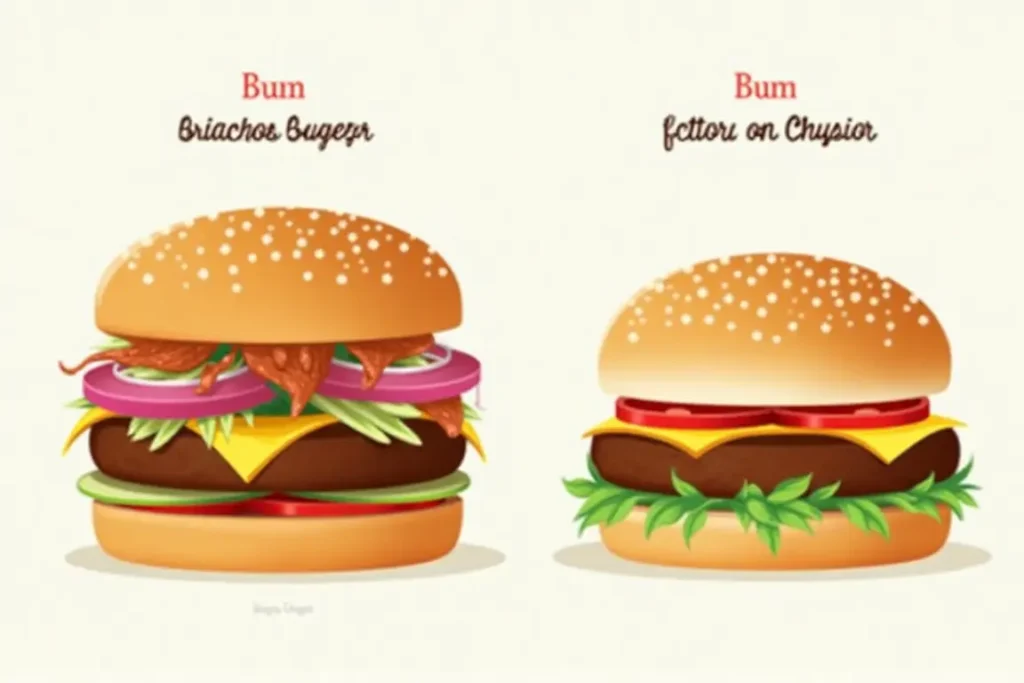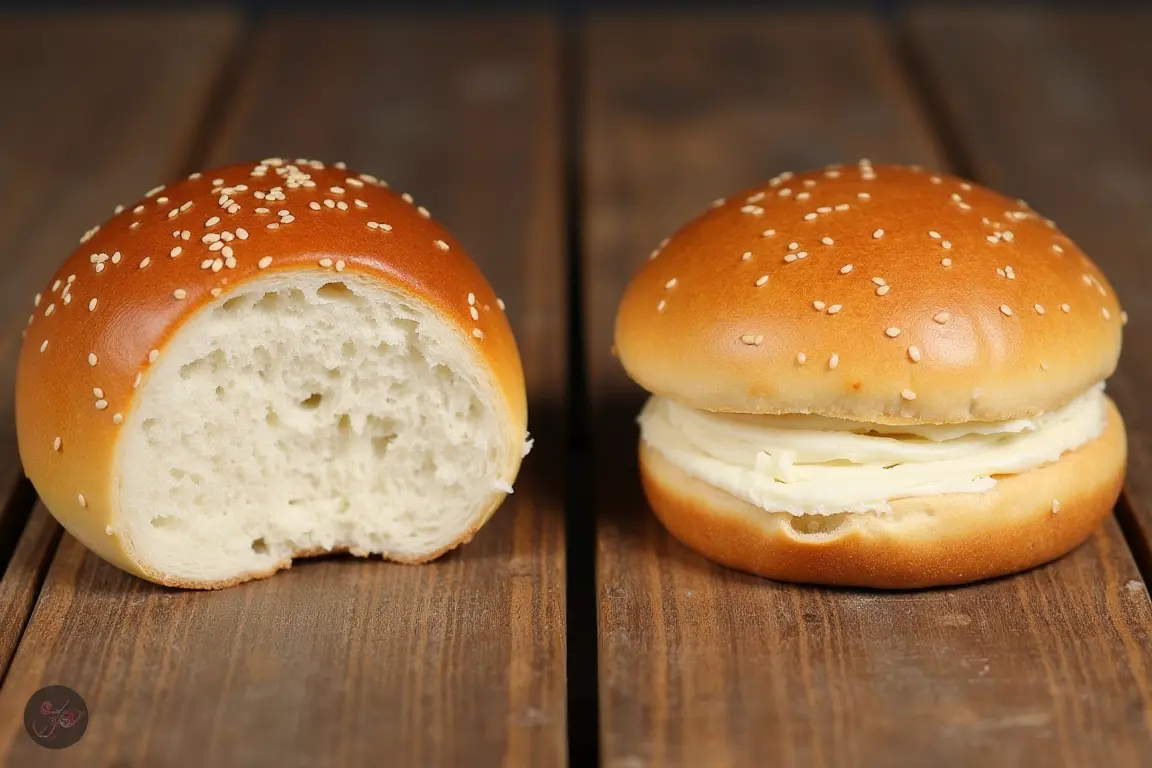The difference between brioche buns and regular hamburger buns lies in their unique qualities, making the choice of bun crucial for crafting the perfect burger. While often overlooked, the bun holds everything together and plays a pivotal role in the overall experience. Among the many options available, these two types of buns stand out. To truly elevate your burger game, understanding their differences is essential.
Why Understanding the Difference Matters
The kind of bun you pick will significantly impact the texture, taste, and the structural integrity of your hamburger. If you’re a gourmet fan of burgers or prefers a quick bite bun, it can be the difference between a good and bad dish. An inconsistency with the bun or hamburger’s ingredients can lead to unbalanced or uninteresting experience. When you are aware of the differences between regular hamburger and brioche buns, you will be able to make an informed decision that is compatible with your preferences in food.
Ditch Dinner Stress — Cook Smart, Not Hard 🍽️
35 quick & budget-friendly 5-ingredient dinners to save your evenings. Simple. Delicious. Ready in 30 minutes or less.
The Role of Buns in the Burger Experience
The bun isn’t just a holder for the patty and toppings—it’s a key player in the burger’s overall taste and mouthfeel. A good bun should strike a balance between softness and sturdiness, ensuring it doesn’t overpower the patty or collapse under the weight of toppings. Furthermore, the taste of the bun must be in harmony with other components of the burger. This will enhance the savoriness of the burger, not being in competition with it.
A Quick Overview of Brioche and Regular Hamburger Buns
Brioche buns They are renowned for their delicious buttery flavor and soft smooth texture, brioche rolls are an essential ingredient in gourmet hamburger recipes. They are made from butter, eggs along with milk. They provide the slight sweetness which is a great match with a range of ingredients, from tart pickles to smoking bacon.
regular hamburger buns They are typically made from simple ingredients like flour as well as yeast, water and a little sugar, the regular hamburger buns are less complicated and have a more neutral flavor. They’re made to be practical and adaptable, which makes them a favorite option for traditional, simple hamburgers.
This exploration will delve into the strengths and characteristics of each type of bun, helping you decide which is best suited for your next burger creation.
What Are Brioche Buns?

The Ingredients and Texture of Brioche Buns
The secret to the unique character of brioche buns lies in their ingredients and preparation. Unlike regular bread, which relies on a simple combination of flour, water, yeast, and salt, brioche incorporates rich, indulgent components that transform its texture and taste. To explore how white buns differ in ingredients, check out what are the ingredients in white buns for a deeper dive into bread-making basics.
Butter, Eggs, and a Rich, Tender Crumb
Brioche buns are made with butter, eggs, and often milk or cream, creating a dough that is softer and more elastic than traditional bread dough. The high fat content from the butter and eggs gives brioche its signature tender crumb and rich, velvety mouthfeel. When baked, the buns develop a golden, slightly shiny crust that contrasts beautifully with their soft interior.
Why Brioche Buns Are Light, Soft, and Slightly Sweet
The combination of milk and sugar in the dough give the brioche buns a distinct taste of sweetness that is a perfect match for savory burger toppings such as hot cheddar, spicy sauces or bacon that is salty. The dough is enhanced to trap more air during the fermentation process and results in a soft, airy feel that stays flexible, yet strong enough to withstand tasty patties and other toppings. The perfect blend of softness, lightness, and a subtle sweetness make Brioche buns an incredibly versatile and delicious option for burgers and other meals.
Brioche buns provide a touch sophistication and elegance to every dish and are a preferred option for those who appreciate the texture and flavor of their hamburger buns.
What Are Regular Hamburger Buns?

Regular hamburger buns are the go-to choice for classic burgers, appreciated for their simplicity and reliability. Unlike the rich, buttery taste of brioche buns, these buns focus on practicality. Their straightforward flavor and sturdy build make them a versatile base that complements a wide range of burger styles and toppings.
Simpler Ingredients for a Balanced Flavor
Regular hamburger buns are made with a few basic ingredients: flour, yeast, water, sugar, and salt. Some variations may include a little milk or fat to add softness, but they skip the richer elements like eggs and butter found in brioche. This simplicity creates a mild, neutral flavor that works well without overshadowing the burger’s other components.
The Role of Flour, Yeast, and Sugar
- Flour: Acts as the base, providing structure and weight.
- Yeast: Helps the dough rise, giving the buns a light, airy texture.
- Sugar: Adds a subtle hint of sweetness to balance the savory ingredients without being overpowering.
With fewer enriching ingredients, these buns have a cleaner, straightforward flavor and a reliable texture.
Texture and Density: A Dependable Foundation
Regular hamburger buns are firmer and denser than brioche buns, making them ideal for holding hearty burger patties and generous toppings. Their sturdiness prevents them from becoming soggy or falling apart, even with juicy fillings. The texture is slightly chewy, offering a pleasant bite that pairs well with the softness of the patty and other layers.
Why Choose Regular Hamburger Buns?
If you’re making a classic cheeseburger, a BBQ burger, or a sandwich loaded with toppings, regular hamburger buns are a dependable choice. Their neutral flavor allows the star ingredients—like the beef patty, cheese, or condiments—to shine without competition. With their practical build and balanced taste, these buns are a staple for burger enthusiasts.
Key Differences Between Brioche Buns and Regular Hamburger Buns

When choosing between brioche buns and regular hamburger buns, understanding their key differences can help you select the perfect match for your burger. These differences lie in their ingredients, texture, and appearance, all of which contribute to the unique characteristics of each bun.
Ingredients: The Flavor Profile of Butter and Eggs vs. the Neutral Flavor of Regular Buns
The Impact of Sugar Content: Sweetness vs. Savory
Brioche buns are enriched with butter, eggs, and a higher sugar content, giving them a sweet, buttery flavor. This sweetness complements rich or tangy toppings, like barbecue sauce or caramelized onions. In contrast, regular hamburger buns are less sweet, allowing the savory elements of a burger to take center stage.
How the Different Fat Content Affects the Buns’ Softness and Moisture
The fat content in brioche buns, thanks to the butter and eggs, makes them soft, tender, and slightly moist. Regular hamburger buns, with their leaner dough, are firmer and drier, offering a more neutral texture that holds its shape well with heavier fillings.
Texture: Light and Airy vs. Firm and Chewy
The Effect of Enriched Dough vs. Simple Yeast-Raised Dough
Brioche buns, made from enriched dough, are light and airy with a delicate crumb. They feel luxurious and almost melt in your mouth. Regular hamburger buns, made from a simpler yeast-raised dough, are denser and chewier, offering a heartier bite.
How Each Type of Bun Holds Up to a Juicy Burger Patty
The airy structure of brioche buns can struggle under the weight of particularly juicy or heavily loaded burgers, sometimes becoming soggy. Regular buns, with their firmer texture, provide better support and durability for burgers with lots of toppings or sauces.
Appearance: Glossy Finish of Brioche vs. Matte Look of Regular Buns
The Egg Wash and Golden Hue of Brioche Buns
Brioche buns stand out with their shiny, golden-brown crust, achieved through an egg wash before baking. This glossy finish gives them a polished, gourmet look that elevates any dish.
The Simpler Appearance of Regular Hamburger Buns
Regular hamburger buns have a matte finish and a more understated, homey look. Their plain surface might not grab attention, but their simplicity suits a wide range of burgers, from classic to casual.
Nutritional Differences Between Brioche Buns and Regular Hamburger Buns
When deciding between brioche buns and regular hamburger buns, understanding their nutritional differences is crucial, especially if you’re mindful of calorie intake or specific dietary needs. These differences stem from the ingredients used to make each type of bun.
Calorie Count: Why Brioche Buns Are Higher in Calories
Brioche buns are generally higher in calories compared to regular hamburger buns. This is due to their enriched dough, which includes calorie-dense ingredients like butter, eggs, and sugar. A typical brioche bun can contain 150–200 calories, depending on its size, compared to 120–150 calories for a regular hamburger bun of similar size.
Sugar, Fat, and Other Nutritional Factors
- Sugar: Brioche buns contain more sugar, contributing to their slightly sweet flavor. This higher sugar content not only increases the calorie count but also makes them less suitable for those monitoring their sugar intake.
- Fat: The butter and eggs in brioche buns also raise their fat content, providing a richer flavor and softer texture but adding more saturated fat compared to regular buns.
- Protein: Thanks to the eggs, brioche buns may offer a slightly higher protein content, though the difference is minimal.
What You Get from Regular Hamburger Buns Nutritionally
Regular hamburger buns are simpler and leaner in composition. They typically have less sugar and fat, resulting in fewer calories per serving. Nutritionally, regular buns:
- Contain more carbohydrates relative to fat due to their basic ingredients (flour, yeast, water, and a small amount of sugar).
- Are lower in saturated fat and calories, making them a lighter option for those aiming to reduce their intake.
- Offer a more neutral nutritional profile, making them a versatile choice for balanced meals.
How to Choose Between Brioche Buns and Regular Hamburger Buns for Your Burger

The choice between brioche buns and regular hamburger buns depends on the type of burger experience you’re aiming for. Each type of bun has unique strengths that make it suitable for specific occasions and burger styles. Here’s a guide to help you make the perfect choice.
When to Use Brioche Buns: For Special Occasions or Gourmet Burgers
Brioche buns are the go-to choice when you want to elevate your burger experience. Their rich, buttery flavor and soft texture add a gourmet touch, making them ideal for more indulgent creations.
Why Brioche Is Ideal for Richer, More Flavorful Burgers
- Enhances Complex Flavors: The slightly sweet taste of brioche pairs beautifully with rich toppings like brie cheese, caramelized onions, or truffle aioli.
- Perfect for Juicy Patties: Their softness complements tender, high-quality beef or premium alternatives like wagyu or plant-based gourmet patties.
- Special Occasions: Brioche buns are an excellent choice for upscale gatherings or when presentation matters, thanks to their golden, glossy appearance.
Brioche buns are best suited for burgers that are more than just a quick meal—they’re ideal for recipes where the bun plays a starring role alongside gourmet ingredients.
When to Opt for Regular Hamburger Buns: Classic and Simple
Regular hamburger buns shine in casual, unfussy settings where practicality and simplicity take precedence. Their neutral flavor and sturdier build make them perfect for classic burger recipes and everyday meals.
The Best Applications for Regular Hamburger Buns: Casual Meals and Backyard BBQs
- Classic Cheeseburgers: Regular buns let the flavors of the beef patty, cheese, and condiments take the spotlight without adding sweetness or richness.
- Backyard BBQs: They’re reliable for burgers piled high with toppings, as their firmer texture holds up well to sauces and extra ingredients.
- Quick and Easy Meals: Their straightforward flavor works with a variety of fillings, from grilled chicken to veggie patties, making them versatile for any meal.
If you’re hosting a family barbecue or preparing a traditional burger, regular hamburger buns are a practical and crowd-pleasing choice.
Can You Make Brioche Buns at Home?
Making your own buns at home can be a rewarding culinary adventure. While both brioche buns and regular hamburger buns can be made from scratch, their preparation processes vary significantly in complexity, effort, and time required.
The Complexity of Making Homemade Brioche vs. Regular Hamburger Buns
Brioche buns are more challenging to make than regular hamburger buns due to their enriched dough, which requires precise handling and longer preparation times. Regular hamburger buns, by contrast, are simpler and more straightforward, making them an ideal starting point for novice bakers.
What to Expect from Homemade Brioche Buns in Terms of Time, Effort, and Ingredients
- Ingredients: Brioche dough requires butter, eggs, milk, and sugar in addition to the basic bread-making ingredients like flour and yeast. These components need to be incorporated carefully to achieve the right texture and flavor.
- Effort: The dough is softer and stickier, requiring more kneading and often a stand mixer to handle the consistency. It also demands patience, as multiple rising stages are needed to develop the light, airy structure.
- Time: Brioche buns typically take longer to prepare, with resting and rising times of several hours, or even overnight, to allow the enriched dough to fully develop its characteristic flavor and texture.
Despite the effort, homemade brioche buns are worth the work for their superior flavor and luxurious texture, perfect for gourmet burgers or special occasions.
Step-by-Step Guide to Making Regular Hamburger Buns from Scratch
Regular hamburger buns are much easier and faster to make, requiring fewer ingredients and less kneading. They are perfect for home bakers looking to whip up a quick, reliable batch of buns for everyday meals. If you’re curious about exploring lighter options, consider trying egg white burger buns for a unique twist on the classic recipe.
Easy-to-Follow Recipe for Homemade Hamburger Buns
Ingredients:
- 3 ½ cups all-purpose flour
- 1 packet (2 ¼ tsp) active dry yeast
- 2 tbsp sugar
- 1 tsp salt
- ¾ cup warm water
- ¼ cup warm milk
- 2 tbsp unsalted butter, melted
- 1 egg
Instructions:
- Activate Yeast: In a small bowl, combine warm water, warm milk, sugar, and yeast. Let it sit for 5–10 minutes until frothy.
- Mix Ingredients in a bowl large enough, mix both the salt and flour. Mix in the yeast as well as the butter and egg. Mix until a dough is formed.
- Knead the dough: Knead the dough on an unfloured surface for 8-10 minutes, until it’s smooth and elastic. You can also utilize a stand mixer equipped with the dough hook to work for about 5-6 minutes.
- The first rise: Put the dough into a bowl with grease covered using a fresh kitchen towel and allow it to rest in a cool area for about a couple of hours or until it has doubled in size.
- The Buns Shape: The dough should be pounded down and cut it into eight equal pieces. Make the pieces into balls, then make sure to flatten it slightly. Set on a baking sheet that is lined with parchment.
- Second Rise: Cover the buns loosely with a towel and let them rise for another 30–40 minutes.
- Bake: Preheat the oven to 375°F (190°C). Brush the buns with an egg wash for a shiny finish (optional) and bake for 15–18 minutes, or until golden brown.
- Cool: Allow the buns to cool completely before slicing.
Homemade regular hamburger buns are quick, easy, and versatile, offering a fresh and flavorful alternative to store-bought options.
FAQs About Brioche Buns vs. Regular Hamburger Buns
Here are some common questions about brioche buns and regular hamburger buns to help you understand their differences and decide which suits your needs best.
Do Brioche Buns Taste Better Than Regular Hamburger Buns?

Taste is subjective, and the “better” option depends on personal preference. Brioche buns have a rich, buttery flavor with a slight sweetness, making them ideal for gourmet burgers or those with bold flavors. Regular hamburger buns, on the other hand, are neutral in taste, allowing the burger’s ingredients to shine. If you prefer a simple, classic burger, regular buns might be the better choice for you.
Can You Use Brioche Buns for Every Type of Burger?
Brioche buns work well for many types of burgers but are best suited for recipes with richer, more flavorful ingredients. Their slightly sweet flavor may not complement all burger types, especially those with very spicy or tangy toppings. Additionally, their softer texture may not hold up well with overly juicy patties or heavy toppings. For heartier or messier burgers, regular buns might provide better structural integrity.
Are Brioche Buns Healthier Than Regular Hamburger Buns?
Not necessarily. Brioche buns are higher in calories, sugar, and fat due to the butter, eggs, and sugar used in their dough. Regular hamburger buns are simpler and often lower in calories, making them a lighter choice. If health or calorie concerns are a priority, regular buns are usually the more diet-friendly option.
Why Are Brioche Buns More Expensive Than Regular Hamburger Buns?
Brioche buns are more expensive because they require premium ingredients like butter and eggs, which increase production costs. The preparation process is also more labor-intensive, with additional rising time needed to develop their soft, airy texture. These factors contribute to their higher price point compared to regular hamburger buns, which use simpler ingredients and are easier to mass-produce.
Can I Freeze Both Brioche and Regular Hamburger Buns?
Yes, both types of buns can be frozen to extend their shelf life. Here’s how:
- Wrap each bun individually: Wrap each bun in aluminum foil to protect against burning in the freezer.
- Store in an Airtight Bag: Place the wrapped buns in a resealable freezer bag or airtight container.
- Freeze You can store it for as long as 3 months in the freezer.
When ready to use, let the buns thaw at room temperature or warm them gently in the oven. Brioche buns may retain their softness better than regular buns after freezing, but both will taste fresh if properly stored.
Conclusion: Which Bun Is Right for You?
Choosing between brioche buns and regular hamburger buns ultimately comes down to your personal taste and the type of burger experience you’re aiming for. Each bun has unique qualities that make it suited to specific occasions and flavor profiles.
Brioche Buns: For Gourmet Burgers and Special Occasions
If you’re seeking a rich, buttery flavor with a hint of sweetness, brioche buns are the perfect choice. They’re ideal for gourmet recipes, indulgent toppings, and events where presentation matters just as much as taste. To further explore bun ingredients, check out what are the ingredients in white buns for more insights.
Regular Hamburger Buns: For Classic and Casual Meals
For a straightforward, no-fuss burger experience, regular hamburger buns are your best bet. Their neutral flavor and sturdier structure make them versatile for casual meals, backyard barbecues, and burgers loaded with toppings. If you’re interested in lighter options, try egg white burger buns for a fresh take on a classic.
Both buns have their place in creating a satisfying burger experience. The key is matching the bun to your desired flavor, texture, and occasion. Whether it’s a gourmet masterpiece or a classic cheeseburger, the right bun can make all the difference.
